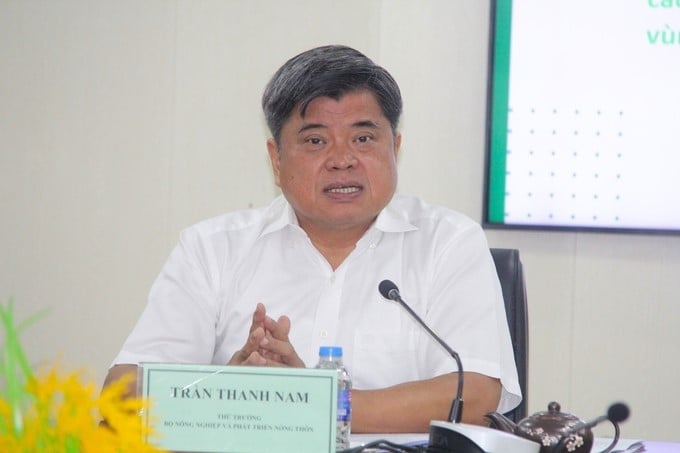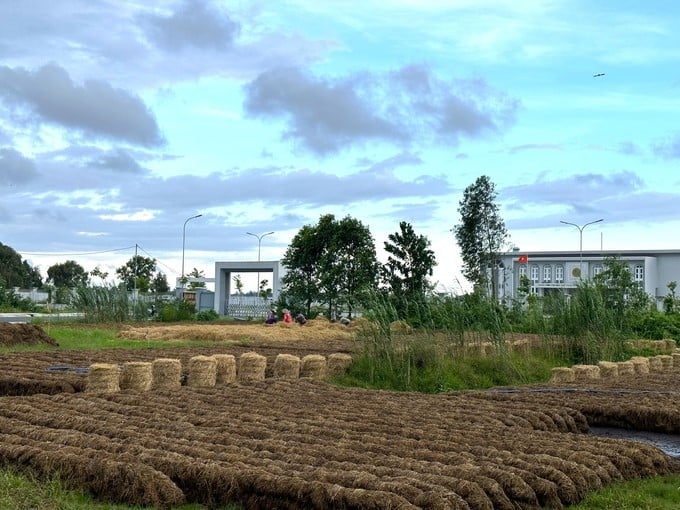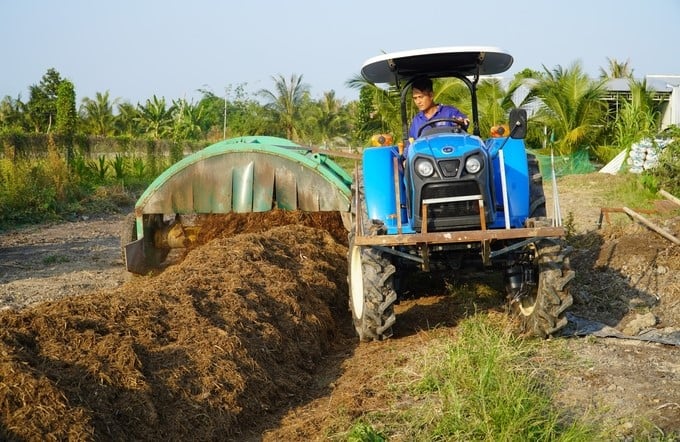May 31, 2025 | 03:42 GMT +7
May 31, 2025 | 03:42 GMT +7
Hotline: 0913.378.918
May 31, 2025 | 03:42 GMT +7
Hotline: 0913.378.918

Deputy Minister Tran Thanh Nam said that there are currently businesses using straw as a raw material to serve the industrial sector. Photo: Kim Anh.
On May 31, in Can Tho City, Deputy Minister of Agriculture and Rural Development Tran Thanh Nam chaired a conference to provide guidance on a number of contents related to the rights and responsibilities of organizations and units participating in the 1 million hectares of high-quality rice project.
According to the project content, when participating, cooperative members must commit not to burn or bury straw in flooded fields without solutions to limit greenhouse gas emissions. At the same time, cooperative members must collect straw out of the field according to Decision 145/QD-TT-CLT of the Department of Crop Production (Ministry of Agriculture and Rural Development - MARD). However, some delegates said that it is now very difficult for farmers to remove straw from the field.
Responding to this opinion, Mr. Le Thanh Tung, Deputy Director of the Department of Crop Production, said that moving straw out of the field is part of the farming process mentioned in the project. This method aims to reuse straw for other purposes and increase income for farmers.
According to Mr. Tung, there are currently many businesses and scientists who say they can decompose straw by spreading Trichoderma fungus or other products, but no one has been able to provide a report proving the results. Therefore, to reduce greenhouse gas emissions, straw must be removed from the field. Many localities consider this problem difficult, but it must be done.
To serve the project, the International Rice Research Institute (IRRI) and the Department of Crop Production coordinated to conduct a field investigation of 10,000 rice-growing households in the Mekong Delta. The result showed that the proportion of people able to remove straw from the field was 58% in the winter-spring crop; 32% in the summer-autumn crop; and 25% in the autumn-winter crop.
From the above result, Mr. Tung commented that in all three rice production crops, farmers moved straw out of the fields in all localities. Because straw has so much potential in the future, the removal of straw from the field will steadily increase.
On this issue, Deputy Minister Tran Thanh Nam emphasized: "Do not worry about the problem of straw not being taken out of the field." According to the Deputy Minister, currently, straw in the Mekong Delta is only used to make mushrooms and organic fertilizer. However, businesses have tended to use straw as a raw material for the industrial sector.
"There was a foreign business planning to build a factory in Ha Tinh to make steel from straw. When they heard about the project, they changed their plan and went back to Binh Duong to implement it. Because the Mekong Delta does not have enough industrial land for this business to operate on a scale of 200 hectares," said Deputy Minister Tran Thanh Nam.

Moving straw out of the field is part of the emission-reducing rice farming process mentioned in the 1 million hectares of high-quality rice project. Photo: Kim Anh.
MARD's leader said that the above-mentioned business needs about 1 million tons of straw per year to serve steelmaking. To ensure the supply of straw to meet the business's needs, the agricultural sector of localities must calculate in order to provide continuous supply to help investors operate.
According to the draft decision promulgating instructions for implementing criteria for selecting and participating in the 1 million hectares of high-quality rice project, outside organizations and units participating in the project will benefit according to the provisions of the law and at the same time receive support from relevant mechanisms and policies.
Regarding responsibility, the participating organizations and units must comply with Decision 1490 of the Government, the sustainable farming process, and the MRV plan (a tool to evaluate greenhouse gas emission reduction activities) issued by MARD and implement responsible value chain linkages.

Model of utilizing straw to make organic fertilizer at New Green Farm Cooperative, Can Tho City. Photo: Kim Anh.
International organizations participating in the project will benefit from Vietnam's regulations on emission reduction and the green economy. On the contrary, there is also an obligation to support resources as well as other related issues in the project.
To soon put the draft into implementation, Deputy Minister Tran Thanh Nam directed the Department of Economic Cooperation and Rural Development to coordinate with the Department of Crop Production to soon amend the draft according to comments from the local agricultural sector. By June 7, MARD will continue to receive comments from businesses, proceeding to official issuance.
Translated by Thu Huyen

(VAN) Several scientists and farmers are experimenting with soil treatment in some key durian-growing regions such as Cai Lay (Tien Giang), Dak Song, Gia Nghia, and Dak R’lap (Dak Nong).
/2025/05/25/4127-3-073637_820.jpg)
(VAN) Thanks to the promotion from an FAO-implemented project, vegetable production in greenhouses in Moc Chau has seen strong development, from 1.5 hectares in 2021 to nearly 50 hectares in 2024.

(VAN) FAO has recently supported USD 140,000 to implement the project 'Risk mitigation human-animal interface risks through disease control initiatives in pig farming.'

(VAN) The People's Committee of Tra Vinh province has approved an adjustment to the investment policy for the Green Hydrogen Plant project, increasing its area to approximately 52.76 hectares.
![Reducing emissions from rice fields: [2] Farmers’ commitment to the soil](https://t.ex-cdn.com/nongnghiepmoitruong.vn/608w/files/news/2025/05/05/dsc08881jpg-nongnghiep-140632.jpg)
(VAN) Clean rice cultivation model in Thuong Tan commune, Bac Tan Uyen district, is assisting local residents in achieving sustainable agriculture by substantially reducing costs, increasing productivity, and protecting the environment.

(VAN) At the conference to disseminate Resolution No. 68, AgriS introduced its digital agricultural ecosystem and reaffirmed its commitment to accompanying the Government in promoting private sector development and sustainable agriculture.

(VAN) 'Blue Ocean - Blue Foods' initiative is designed to restore marine ecosystems and establish sustainable livelihoods for local communities by cultivating a minimum of 1,000 hectares of cottonii seaweed in the first three years.